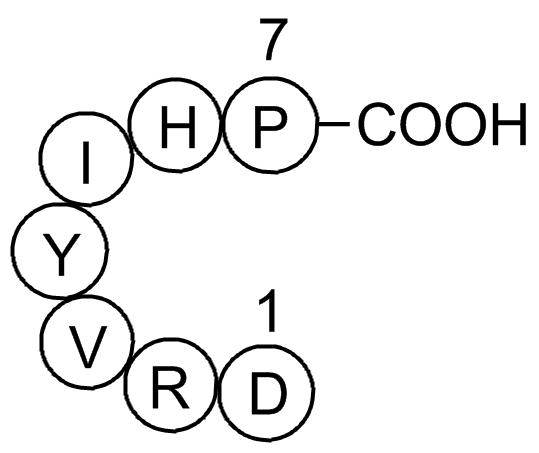Angiotensin (1-7) (Synonyms: Asp-Arg-Val-Tyr-Ile-His-Pro ) |
| Catalog No.GP10077 |
Ang-(1-7) (H - Asp - Arg - Val - Tyr - Ile - His - Pro - OH) is an endogenous peptide fragment that can be produced from Ang I or Ang II via endo- or carboxy-peptidases respectively[1].
Products are for research use only. Not for human use. We do not sell to patients.

Cas No.: 51833-78-4
Sample solution is provided at 25 µL, 10mM.
Ang-(1-7) (H - Asp - Arg - Val - Tyr - Ile - His - Pro - OH) is an endogenous peptide fragment that can be produced from Ang I or Ang II via endo- or carboxy-peptidases respectively[1].
As described for Ang II, Ang-(1-7) also has a broad range of effects in different organs and tissues and goes beyond its initially described cardiovascular and renal actions. Those effects are mediated by Mas and can counter-regulate most of the deleterious effects of Ang II. The interaction Ang-(1-7)/Mas regulates different signaling pathways, such as PI3K (phosphoinositide 3-kinase)/AKT and ERK (extracellular signal-regulated kinase) pathways and involves downstream effectors such as NO, FOXO1 (forkhead box O1) and COX-2 (cyclo-oxygenase-2). Through these mechanisms, Ang-(1-7) is able to improve pathological conditions including fibrosis and inflammation in organs such as lungs, liver and kidney. [2]
In addition, this heptapeptide has positive effects on metabolism, increasing the glucose uptake and lipolysis while decreasing insulin resistance and dyslipidemia. Ang-(1-7) is also able to improve cerebroprotection against ischemic stroke, besides its effects on learning and memory. The reproductive system can also be affected by Ang-(1-7) treatment, with enhanced ovulation, spermatogenesis and sexual steroids synthesis. Finally, Ang-(1-7) is considered a potential anti-cancer treatment since it is able to inhibit cell proliferation and angiogenesis.[2]
References:
1. Santos et al (2000) Angiotensin-(1-7): an update. Regul.Pept. 91 45.
2. Danielle G. P., Thiago V., Robson A. S. Angiotensin-(1-7): beyond the cardio-renal actions. Clinical Science (2013) 124, (443–456)
Average Rating: 5 (Based on Reviews and 30 reference(s) in Google Scholar.)
GLPBIO products are for RESEARCH USE ONLY. Please make sure your review or question is research based.
Required fields are marked with *




















